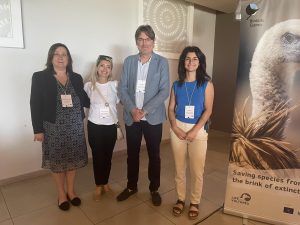 What a week! From May 22-24, 2024, the International Wildlife Crime Conference took place in Limassol, Cyprus. Participants from various countries and organizations gathered for presentations, discussions on challenges and achievements, and setting priorities for combating wildlife crimes. The conference focused on issues like illegal wildlife poisoning, trapping, and electrocution in the Balkan and Mediterranean regions. Representing North Macedonia were Arta Starova and Aleksandra Todorovska from the Macedonian Ecological Society, both involved in the BalkanDetox LIFE project, along with General State Environmental Inspector Darko Blinkov and Professor Marina Malish Sazdovska, who teaches Environmental Crime at the Faculty of Security.
What a week! From May 22-24, 2024, the International Wildlife Crime Conference took place in Limassol, Cyprus. Participants from various countries and organizations gathered for presentations, discussions on challenges and achievements, and setting priorities for combating wildlife crimes. The conference focused on issues like illegal wildlife poisoning, trapping, and electrocution in the Balkan and Mediterranean regions. Representing North Macedonia were Arta Starova and Aleksandra Todorovska from the Macedonian Ecological Society, both involved in the BalkanDetox LIFE project, along with General State Environmental Inspector Darko Blinkov and Professor Marina Malish Sazdovska, who teaches Environmental Crime at the Faculty of Security.
Key takeaways included:
- There is insufficient national coordination and resources for investigations;
- There is a need for more education and public awareness raising in the judiciary system;
- Electrical infrastructure causes wildlife mortality and species endangerment, which will worsen with population growth and increased energy demand. Retrofitting is not a long-term solution; future expansion should promote redesigned pylons and the use of XLPE or underground wires;
- The strong international network working on these issues should continue to share information, support and create an open database on consistent reports and cases of wildlife crimes.
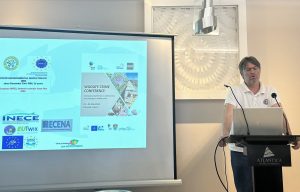
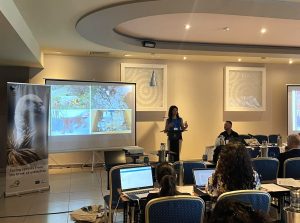
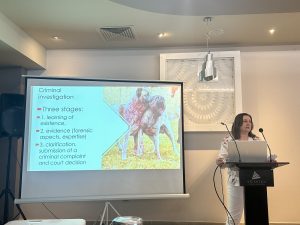
The conference addressed the devastating consequences of illegal bird killing, such as the disappearance of Griffon vulture pairs in Cyprus in 2023. Presentations emphasized the role of police, special K9 units, the use of GPS transmitters and ranger services in preventing these activities and collaborating with local communities.
Jose-Antonio Alfaro from Europol highlighted the need for deeper investigations into wildlife trafficking, noting challenges like document fraud, legislative discrepancies, and corruption. On an international level, Clairie Papazoglou discussed priorities of the Convention on Migratory Species, emphasizing Resolution 11.16 and the importance of MIKT (The Intergovernmental Task Force on Illegal Killing, Taking and Trade of Migratory Birds in the Mediterranean) and IKB Action Plans. She also called for better understanding of motivations behind these illegal activities through detailed sociological research. Ruben Moreno-Opo, from the Spanish Ministry for Ecological Transition, discussed Spain’s best practices in combating bird electrocution, emphasizing legislation that is important in targeting hazardous powerlines whilst from an NGO perspective Carlota Viada Sauleda shared her work on the Aquila a-LIFE project, advocating for insulated cables and structural changes to pylons through the use of White papers.
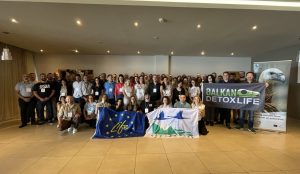 Representatives from various countries, including North Macedonia shared wildlife crime case studies, stressing the need for improved national capacities, law enforcement education, and inter-governmental collaboration.
Representatives from various countries, including North Macedonia shared wildlife crime case studies, stressing the need for improved national capacities, law enforcement education, and inter-governmental collaboration.
The event was hosted by Birdlife Cyprus and the Vulture Conservation Foundation as part of the BalkanDetox LIFE (LIFE19 GIE/NL/001016) and LIFE with Vultures (LIFE18 NAT/CY/001018) projects.
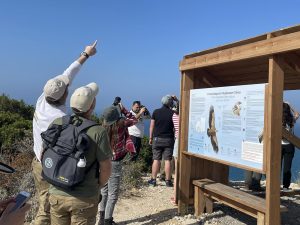 On the final day, the group enjoyed an extraordinary field trip to the breathtaking Episkopi Cliffs, after which we visited a local goat farm, and a nearby feeding station where Griffon vultures soared above us as company along the hike through Cyprus’s picturesque landscapes.
On the final day, the group enjoyed an extraordinary field trip to the breathtaking Episkopi Cliffs, after which we visited a local goat farm, and a nearby feeding station where Griffon vultures soared above us as company along the hike through Cyprus’s picturesque landscapes.



